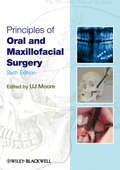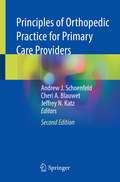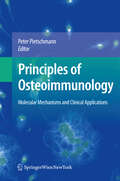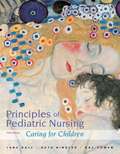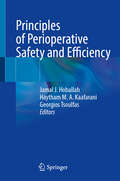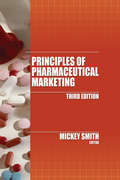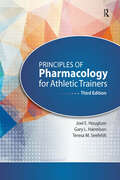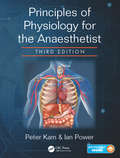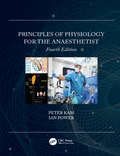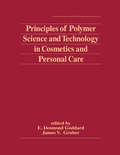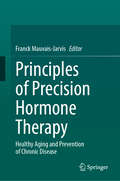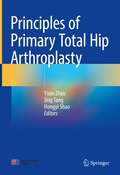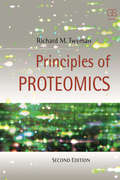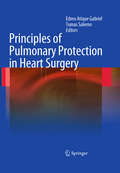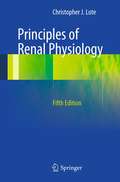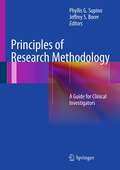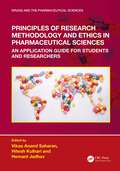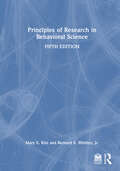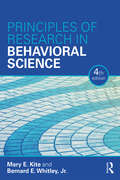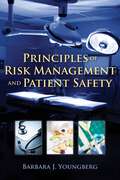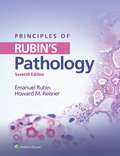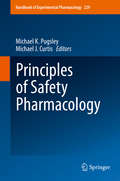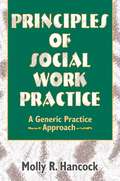- Table View
- List View
Principles of Oral and Maxillofacial Surgery
by U. J. MooreFirst published over 40 years ago, this is one of the best-established introductory texts for students of dentistry and oral and maxillofacial surgery. It covers each of the basic tenets of the specialty, from patient management to anxiety and pain control, to implant dentistry and maxillofacial trauma. The sixth edition has been thoroughly revised to reflect the latest developments in the field, and each chapter has been completely updated and restructured. New chapters specifically on implant dentistry have been included. This latest edition also features for the first time colour images of clinical procedures, clear colour diagrams and e-learning references. This book is of undoubted value for students and recently qualified practitioners of dentistry, for whom it acts as a complete and ready reference through which to gain a firm foothold in oral and maxillofacial surgery. Key features • Covers each basic tenet of oral and maxillofacial surgery • Presents information in a clear and student-friendly style • Reflects latest developments in the field with updates throughout • Provides new chapters specifically on implant dentistry • Includes colour clinical photographs and diagrams
Principles of Orthopedic Practice for Primary Care Providers
by Jeffrey N. Katz Cheri A. Blauwet Andrew J. SchoenfeldPrimary care providers (physicians, nurse practitioners, physician assistants) make decisions on a daily basis regarding treatment for musculoskeletal problems, including referrals to orthopedic surgeons and other specialists. Despite the large number of patients presenting with musculoskeletal complaints, primary care providers often feel poorly educated about how to assess and manage these conditions. Now in its fully revised second edition, Principles of Orthopedic Practice for Primary Care Providers continues to be a go-to resource for clinicians interested in the effective treatment of musculoskeletal disorders. Written by expert orthopedic, physical medicine and pain management specialists at major Harvard teaching hospitals, the second edition of Principles of Orthopedic Practice for Primary Care Providers represents a high-yield and succinct resource on the assessment and management of musculoskeletal conditions. Chapters overview specific body parts, typical presentations of disease, options for diagnostic testing, treatment paradigms, and anticipated outcomes of management both in the primary care setting and following specialist consultation. The text offers suggested pathways for working up and treating these problems with an emphasis on when referral to a specialist, or surgical intervention, is needed. While all previous chapters have been fully revised, this edition also includes nine brand new chapters, including chapters on pain management, hip-spine syndrome, adult spinal deformity, sports-related injuries, and cost and quality in musculoskeletal care.
Principles of Osteoimmunology
by Peter PietschmannThis fully updated and extended second edition provides a comprehensive overview on the basic concepts of the rapidly developing field of osteoimmunology and also offers in-depth insights into the molecular mechanisms of bone diseases. Clinical data is presented and put into context with the latest research findings. This second edition in addition discusses the latest topics in transplantation immunology. The book addresses scientists and physicians working in immunology, pathophysiology and osteology.
Principles of Pediatric Nursing: Caring for Children (Fifth Edition)
by Jane W. Ball Ruth C. Bindler Kay J. CowenThe goal of the fifth edition of this textbook is to provide core pediatric nursing knowledge that prepares students for excellence in nursing, and to offer the tools of scholarship and critical thinking required during practice.
Principles of Perioperative Safety and Efficiency
by Jamal J. Hoballah Georgios Tsoulfas Haytham M. A. KaafaraniPerioperative safety continues to be a global challenge. It is estimated that approximately 200 million surgical procedures are performed annually worldwide, and despite various national and global safety initiatives, perioperative adverse event rates remain alarmingly high. Although hospitals and governmental agencies impose safety standards and certification by organizations such as the Joint Commission, which can address issues of perioperative safety, many hospitals in developed, developing or underdeveloped countries lack the resources or knowhow to decrease perioperative adverse events. There is a great opportunity for improving perioperative safety worldwide especially in underdeveloped or developing countries. Filling a gap in the literature, this book teaches healthcare providers the basic principles of perioperative safety and efficiency, including checklists and processes to reduce adverse events. Presented here are the basics of intraoperativemonitoring and safety measures to reduce patient adverse events, including wrong site surgery, electric burn injury, deep venous thrombosis, surgical site infection and foreign body retention. Emphasis is given toward developing awareness into measures preventing occupational injuries, such as sharp injury, radiation exposure, laser exposure and smoke hazard. It also addresses dealing and reporting adverse events and disruptive behaviors in the operating rooms as well as new measures for enhanced recovery following surgery and anesthesia. Principles of Perioperative Safety and Efficiency is a valuable resource and reference for all operating room personnel including surgeons, surgical residents, medical students and nurses.
Principles of Pharmaceutical Marketing
by Mickey C. Smith Ph.D.Principles of Pharmaceutical Marketing, Third Edition offers the perspectives of both those who teach and those who practice pharmaceutical marketing. This reflects the need for and the effort to provide the most relevant “real world” approach to this complex and fascinating field. This text is designed for undergraduate students in pharmacy whose background in marketing is limited, those actually involved in pharmaceutical marketing, and anyone desiring an introduction to the intricacies involved in the marketing of pharmaceutical products.
Principles of Pharmacogenetics and Pharmacogenomics
by Russ B. Altman David Flockhart David B. GoldsteinThe study of pharmacogenetics and pharmacogenomics focuses on how our genes and complex gene systems influence our response to drugs. Recent progress in clinical therapeutics has led to the discovery of new biomarkers that make it technically easier to identify groups of patients which are more or less likely to respond to individual therapies. The aim is to improve personalised medicine - not simply to prescribe the right medicine, but to deliver the right drug at the right dose at the right time. This textbook brings together leading experts to discuss the latest information on how human genetics impacts drug response phenotypes. It presents not only the basic principles of pharmacogenetics, but also clinically valuable examples that cover a broad range of specialties and therapeutic areas. This textbook is an invaluable introduction to pharmacogenetics and pharmacogenomics for health care professionals, medical students, pharmacy students, graduate students and researchers in the biosciences.
Principles of Pharmacology for Athletic Trainers
by Joel Houglum Gary Harrelson Teresa SeefeldtPrinciples of Pharmacology for Athletic Trainers, Third Edition continues the tradition of past editions to provide applications of pharmacological principles specifically aimed at the athletic trainer. The drug categories that are included are primarily those that may be pertinent to the treatment of athletic injuries or that may affect athletic performance.Drs. Joel Houglum, Gary Harrelson, and Teresa Seefeldt have taken a unique aspect to the organization and design of the Third Edition to be instructional discussions regarding the use and effects of drugs and of the disease states treated by these drug categories. Additionally, there is a specific discussion of the role of the athletic trainer regarding the therapeutic use and effects of these drugs.Features of the Third Edition: Satisfies all of the CAATE Educational Competencies on pharmacology Advanced organizers and specific learning objectives at the beginning of each chapter Summaries after each major topic within the chapter Case studies and clinical applications Discussion on popular fitness supplements Key words are in italics and defined in the glossary Concept maps present important, yet complex, processes in a concise, graphical way Shaded textboxes throughout include additional information and are beneficial for the reader to recall a key concept addressed in an earlier chapter New ancillary materials specifically for faculty that include PowerPoint slides and test bank questions for each chapter Included with the text are online supplemental materials for faculty use in the classroom.Principles of Pharmacology for Athletic Trainers, Third Edition will continue to be the go-to resource to determine the best pharmacological treatment strategy and management by athletic trainers.
Principles of Physiology for the Anaesthetist
by Peter Kam Ian PowerPrinciples of Physiology for the Anaesthetist, now in its Third Edition, continues to provide candidates with a "tailor-made" alternative to more general physiology textbooks and delivers information designed and written specifically with the trainee anaesthetist in mind. The book covers the physiology of all major organ systems, with specific emph
Principles of Physiology for the Anaesthetist
by Peter Kam Ian PowerThis book provides readers with an anaesthesia-focused alternative to general physiology textbooks. The new edition has been reorganised with the trainee anaesthesist in mind, into shorter bite-sized chapters ideal for exam revision. The content includes the physiology of all major organ systems, with specific emphasis on the nervous, respiratory, and cardiovascular systems as well as special sections on pain, aging, specific environments and obesity. Alongside the learning objectives, reflection points and a handy summary of physiological equations and tables, there is greater emphasis on clinical application in this fourth edition, with applied physiology included in almost every section.
Principles of Polymer Science and Technology in Cosmetics and Personal Care (Cosmetic Science and Technology)
by E. Desmond Goddard James V. GruberThis valuable reference bridges the widening gap between the knowledge about the use of polymers in the cosmetics industry and the greater understanding of polymeric behaviour necessary for continuing research and development. Providing both a solid grounding in polymer science for novices to the field and fresh insights for experienced researchers, 'Principles of Polymer Science and Technology in Cosmetics and Personal Care' introduces fundamentals of polymers, including their classification, molecular weight definitions, thermodynamics, rheology and properties in the solid and semi-solid state.
Principles of Precision Hormone Therapy: Healthy Aging and Prevention of Chronic Disease
by Franck Mauvais-JarvisHormones—such as estrogens, testosterone, thyroid hormones, and growth hormone—are essential for metabolic homeostasis in all cells. However, their levels decline with age, contributing to aging and chronic disease. Proper hormone therapy can help delay the onset of age-related diseases, yet there is currently no authoritative, up-to-date resource on precision hormone optimization for healthy aging. Current standard of care textbooks rely on outdated concepts, while books aimed at non-specialist clinicians and patients are often written by non-experts and lack a solid scientific foundation. This book bridges that gap by presenting cutting-edge scientific data and insights from leading academic and private practice experts on the role of hormone optimization in healthy aging. It dispels common misconceptions about hormone therapy risks and highlights the proven benefits of precision hormone treatments. Drawing on both scientific evidence and clinical experience, it explores the distinctions between synthetic hormones and bioidentical, physiological hormones. Designed to challenge conventional thinking, this book aims to inspire discussion and further research among scientists and healthcare practitioners. It is an essential resource for basic and clinical researchers seeking translational knowledge on hormone therapy, as well as clinicians looking to integrate hormone optimization into their practice.
Principles of Primary Total Hip Arthroplasty
by Yixin Zhou Jing Tang Hongyi ShaoThis book covers pertinent principles and practical surgical techniques related to primary total hip arthroplasty (THA) including complex cases. Written by experienced hip and knee surgeons, this book introduces the basic concepts of THA, helping the reader understand the basic science and history of THA. More chapters cover the preoperative planning and preparation, exposure using the various approaches, together with tips and tricks to position implants properly. Navigation-guided and robotic THA techniques are also included. Complications related to surgery, such as leg-length discrepancy, periprosthetic infections and fractures, hip instability, and deep vein thrombosis, are further discussed. Complex situations in specific diseases and pathology, such as rheumatoid hip arthritis, ankylosis spondylitis, and post-traumatic arthritic hip diseases are demonstrated.
Principles of Proteomics
by Richard Twyman Ph.D Cfe George A.Principles of Proteomics, Second Edition, provides a concise and user-friendly introduction to the diverse technologies used for the large-scale analysis of proteins, as well as their applications, and their impact in areas such as drug discovery, agriculture, and the fight against disease. Proteomics is a fast-advancing field in which researchers seek to capture all the proteins in the cell and characterize them in ever more detail. Principles of Proteomics has been fully updated to reflect the most recent developments in the field without losing its focus on the underlying principles. With worked examples, case studies profiling both established and emerging technologies, and further reading lists for each chapter, Principles of Proteomics is an ideal introduction for students, researchers and those working in the industry.
Principles of Pulmonary Protection in Heart Surgery
by Tomas Salerno Edmo Atique GabrielThis book aims to cover all aspects of pulmonary protection in heart surgery including repercussions from cardiopulmonary bypass on the lung, a vast section on lung perfusion, including information on cardioplegic arrest, beating heart surgery, arterial and venous blood and ischemia-reperfusion injury.
Principles of Reiki: What it is, how it works, and what it can do for you
by Kajsa Krishni BorängReiki is an ancient Japanese healing system based on channelling spiritual energy through the hands. Taught through initiation, it is extremely effective for treating many health and emotional problems, and brings a profound sense of relaxation and peace. This concise introduction covers the history and spiritual principles of Reiki, how it is taught and practiced and what to expect from a Reiki treatment. The author explains how Reiki can be used in healing in everyday life and how to find a Reiki teacher. Interesting and informative case vignettes are included throughout. Written in an engaging style, this book is ideal for anyone considering Reiki treatment, or simply interested in finding out more about this healing system. Students and practitioners of Reiki will also find it to be a useful reference, and a perfect introduction to recommend to clients.
Principles of Renal Physiology
by Christopher J. LoteA good knowledge of renal physiology is essential to the understanding of many disease states. The purpose of the book is to set out the principles of renal physiology and normal renal function. Now in its 30th year of continuous publication, this new edition offers a logical progression through renal physiology and pathophysiology. In addition, the anatomy, physiology, pharmacology and pathology of the kidney are covered - making it highly suitable for system based courses. This 5th edition has been extensively revised and features a wealth of new and widely accepted information about kidney function. This includes our understanding of the role of the glycocalyx and structural proteins in glomerular filtration; details of tubular transport, tight junctions and paracellular transport; and an update of the loops of Henle functioning. Principles of Renal Physiology, 5th Edition is a concise and easily readable text ideal for undergraduate medical and medical science students.
Principles of Research Methodology
by Jeffrey S. Borer Phyllis G. SupinoPrinciples of Research Methodology: A Guide for Clinical Investigators is the definitive, comprehensive guide to understanding and performing clinical research. Designed for medical students, physicians, basic scientists involved in translational research, and other health professionals, this indispensable reference also addresses the unique challenges and demands of clinical research and offers clear guidance in becoming a more successful member of a medical research team and critical reader of the medical research literature. The book covers the entire research process, beginning with the conception of the research problem to publication of findings. Principles of Research Methodology: A Guide for Clinical Investigators comprehensively and concisely presents concepts in a manner that is relevant and engaging to read. The text combines theory and practical application to familiarize the reader with the logic of research design and hypothesis construction, the importance of research planning, the ethical basis of human subjects research, the basics of writing a clinical research protocol and scientific paper, the logic and techniques of data generation and management, and the fundamentals and implications of various sampling techniques and alternative statistical methodologies. Organized in thirteen easy to read chapters, the text emphasizes the importance of clearly-defined research questions and well-constructed hypothesis (reinforced throughout the various chapters) for informing methods and in guiding data interpretation. Written by prominent medical scientists and methodologists who have extensive personal experience in biomedical investigation and in teaching key aspects of research methodology to medical students, physicians and other health professionals, the authors expertly integrate theory with examples and employ language that is clear and useful for a general medical audience. A major contribution to the methodology literature, Principles of Research Methodology: A Guide for Clinical Investigators is an authoritative resource for all individuals who perform research, plan to perform it, or wish to understand it better.
Principles of Research Methodology and Ethics in Pharmaceutical Sciences: An Application Guide for Students and Researchers (ISSN)
by Vikas Anand Saharan Hitesh Kulhari Hemant JadhavPharmaceutical researchers are constantly looking for drug products, drug delivery systems and devices for improving the health of society. A scientific and systematic search for new knowledge requires a thorough understanding of research methods and hypothesis design. This volume presents pharmaceutical research through theoretical concepts, methodologies and ethical issues. It fulfils publication ethics course work requirements for students. Chapters have been designed to cater for the curriculum requirements of universities globally. This serves as a guide on how to apply concepts in designing experiments and transforming laboratory research into actual practice.Features: · Complete coverage of research methodology courses for graduate and postgraduate students globally.· Step-by-step assistance in writing technical reports, projects, protocols, theses and dissertations.· Experimental designing in pharmaceutical formulation development and preclinical research designs.· Ethics in using animals in preclinical research and humans in clinical research.· Publication ethics, best practices and guidelines for ensuring ethical writing.· Hypothetical and real-world case studies on ethical issues and measures for prevention and control.
Principles of Research in Behavioral Science
by Mary E. Kite Bernard E. Whitley, JrNow in its fifth edition, this invaluable textbook provides a comprehensive overview of research methods in the behavioral sciences, emphasizing the conceptual challenges inherent in scientific inquiry. Organized to mirror each stage of the research process, this text guides readers through the process, from formulating questions, to collecting data, to interpreting results. Engaging and accessible, the book includes essential topics like measurement issues, correlational research, evaluation research, and integrative literature reviews, often overlooked in other textbooks.Key features include: Balanced coverage of both qualitative and quantitative research methods Structured chapter features, including an outline, key terms, a summary, suggested readings, and reflective questions to facilitate discussion and application of theory Extensively updated chapters reflecting recent advancements, with new discussions on the implications of open science and the challenges of effective online data collection Expanded resources for instructors and students to support teaching and learning Streamlined for an optimal balance of breadth and depth, Principles of Research in Behavioral Science is an indispensable resource for any researcher’s bookshelf. Ideal for advanced undergraduate, graduate, and post-graduate students seeking a strong foundation in research methods, it also serves as a valuable reference for seasoned researchers looking to refresh their knowledge.
Principles of Research in Behavioral Science: Fourth Edition
by Bernard E. Whitley Jr. Mary E. KiteThis book provides a comprehensive overview of research methods in the behavioral sciences, focusing primarily on the conceptual issues inherent in conducting research. It covers topics that are often omitted from other texts, including measurement issues, correlational research, qualitative research, and integrative literature reviews. The book also includes discussions of diversity issues as they related to behavioral science research. New to this edition are chapter boxes that focus on applied issues related to each chapter topic. Throughout the book, readable examples and informative tables and figures are provided. The authors also take a contemporary approach to topics such as research ethics, replication research, and data collection (including internet research).
Principles of Risk Management and Patient Safety
by Barbara J. YoungbergPrinciples of Risk Management and Patient Safety identifies changes in the industry and describes how these changes have influenced the functions of risk management in all aspects of healthcare. The book is divided into four sections. The first section describes the current state of the healthcare industry and looks at the importance of risk management and the emergence of patient safety. It also explores the importance of working with other sectors of the health care industry such as the pharmaceutical and device manufacturers. Important Notice: The digital edition of this book is missing some of the images or content found in the physical edition.
Principles of Rubin's Pathology
by Emmanuel Rubin Howard M. ReisnerPublisher's Note: Products purchased from 3rd Party sellers are not guaranteed by the Publisher for quality, authenticity, or access to any online entitlements included with the product. Principles of Rubin’s Pathology, Seventh Edition distills the renowned coverage of Rubin’s Pathology, Seventh Edition into a focused, approachable guide to the essentials of pathology. This resource introduces principles and mechanisms of pathology, followed by organ-specific information, extracting key information on pathogenesis, epidemiology, and clinical features of diseases. Detailed images clarify challenging content, and companion online resources enable students to learn on the go and confidently prepare for exams.
Principles of Safety Pharmacology
by Michael K. Pugsley Michael J CurtisThis book illustrates, in a comprehensive manner, the most current areas of importance to Safety Pharmacology, a burgeoning unique pharmacological discipline with important ties to academia, industry and regulatory authorities. It provides readers with a definitive collection of topics containing essential information on the latest industry guidelines and overviews current and breakthrough topics in both functional and molecular pharmacology. An additional novelty of the book is that it constitutes academic, pharmaceutical and biotechnology perspectives for Safety Pharmacology issues. Each chapter is written by an expert in the area and includes not only a fundamental background regarding the topic but also detailed descriptions of currently accepted, validated models and methods as well as innovative methodologies used in drug discovery.
Principles of Social Work Practice: A Generic Practice Approach
by Molly R HancockPrinciples of Social Work Practice is the first textbook to deal exclusively and thoroughly with the significant principles of social work practice and methods that integrate these principles into the common base of practice. You will learn from case examples how to apply crucial ethical, personal, and methodological principles to different practice areas. As you increase your understanding of the nature of professional social work and the essence of its value base and Code of Ethics, you also learn to develop approaches to social work practice that are sensitive to a multicultural clientele. You will leave this book with useful skills and a flexibility that allow you to work not only with individuals but also with families, couples, groups, organizations, and communities. As you read Principles of Social Work Practice, you will heighten your sensitivity to the professional worker-client relationship and its role as a primary instrument of positive change. Using this book as a guide, you can develop your own strategies for facilitating change and growth that will result in the satisfaction of long-term personal and social goals. Simultaneously, you will build a framework for social work practice that has at its foundation a strong sense of individual worth and dignity. A unique combination of theory and practice, readers gain insight into: confidentiality the nonjudgmental attitude controlled emotional involvement self-determination respect for the individual empowermentPrinciples of Social Work Practice illustrates for advanced undergraduates and graduate students how to effectively intervene in the conflicts that evolve between clients&’ needs for well-being and development and the demands or restrictions of public attitudes or social policy. You will sharpen your skills and construct indispensable methods for helping individuals establish vital links with their communities.
